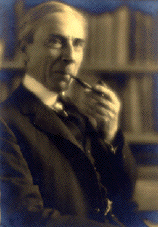May 18: Bertrand Russell
Bertrand Russell (1872)
It was on this date, May 18, 1872, that British mathematician and philosopher Bertrand Arthur William Russell, the third Earl Russell, was born in Trelleck, Monrnouthshire, Wales. Early in his writing career he embraced materialism. His Principia Mathematica is a three-volume work on the foundations of mathematics, written by Russell and Alfred North Whitehead and published in 1910-1913.
But Russell also exercised his social conscience, writing and protesting against World War One, for which he lost a teaching post and later was jailed; protesting against nuclear weapons; and encouraging Rationalism and sexual freedom. Indeed, he wrote, "Religions which condemn the pleasures of sense drive men to seek the pleasures of power. Throughout history, power has been the vice of the ascetic." It was his Marriage and Morals (1929), as much as his atheism, which the New York Supreme Court cited when barring him from teaching at the City University. His 1927 Why I Am Not a Christian began as a speech, then became a book detailing the harmful social consequences of organized religion.
Throughout his life, Russell was an outspoken critic of religion. In Why I Am Not a Christian, he wrote,
You find as you look round the world that every single bit of progress in humane feeling, every improvement in the criminal law, every step toward the diminution of war, every step toward better treatment of the colored races, ... every moral progress that there has been in the world, has been consistently opposed by the organized Churches of the world. I say quite deliberately that the Christian religion ... has been and still is the principal enemy of moral progress in the world. ... Religion is based, I think, primarily and mainly upon fear. It is partly the terror of the unknown ... and the wish to feel that you have a kind of elder brother, who will stand by you in all your troubles and disputes. Fear is the basis of the whole thing — fear of the mysterious, fear of defeat, fear of death. Fear is the parent of cruelty, and therefore it is no wonder if cruelty and religion have gone hand-in-hand.
In Has Religion Made Useful Contributions to Civilization? Russell wrote, "The intolerance that spread over the world with the advent of Christianity is one of its most curious features ... From the age of Constantine to the end of the seventeenth century, Christians were far more fiercely persecuted by other Christians than they were by the Roman Emperors."
Russell was given the Order of Merit in 1949 and the Nobel Prize for Literature ("in recognition of his varied and significant writings in which he champions humanitarian ideals and freedom of thought") in 1950. He remained a prominent public figure until his death from influenza at age 97 in 1970. Bertrand Russell once said, "So far as I can remember, there is not one word in the gospels in praise of intelligence."
Originally published May 2003 by Ronald Bruce Meyer.


